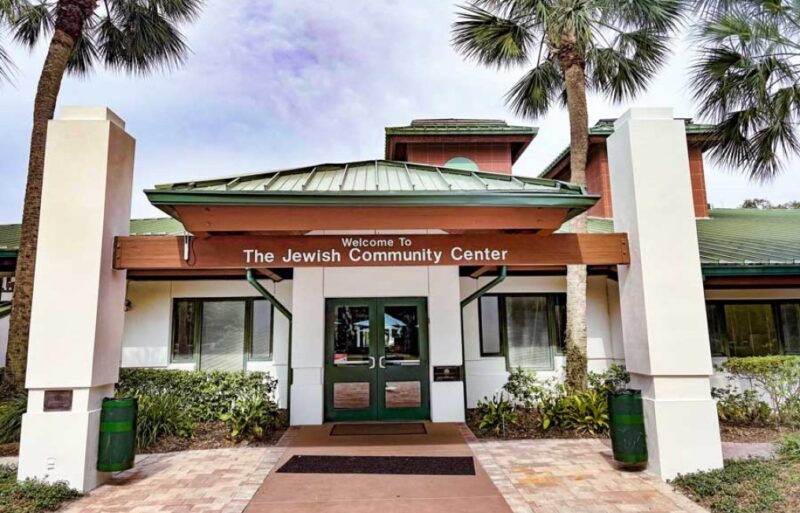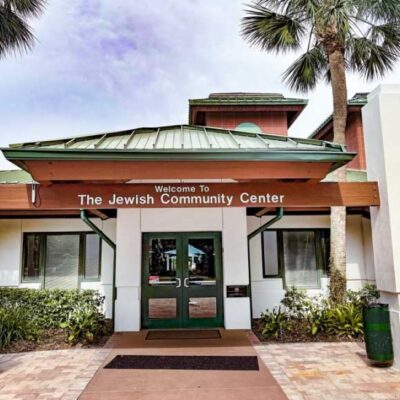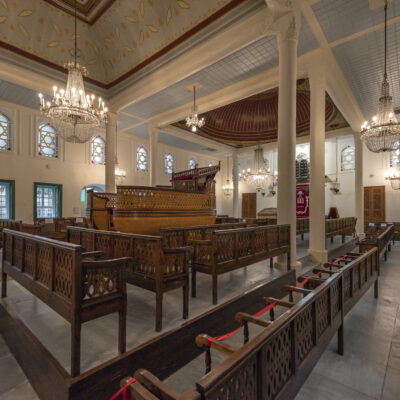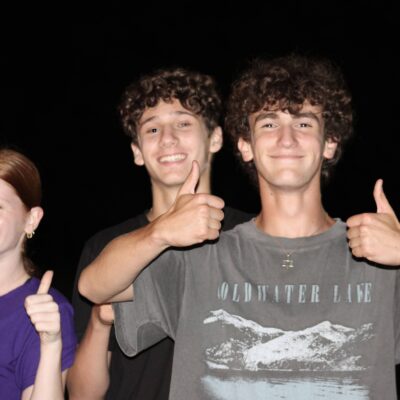DATA DRIVEN
Closure of Tampa Jewish campus highlights importance of demographic studies, expert says
'When you're going to open something like a JCC or a synagogue or a day camp or a preschool, and you do it without doing your homework first, you can make a multimillion-dollar mistake,' Jewish demographer Ira Sheskin says

COURTESY/COHN JCC
The Maureen and Douglas Cohn Jewish Community Campus in Tampa, Fla.
Last week, the Maureen and Douglas Cohn Jewish Community Campus in Tampa, Fla., announced it would be closing. The announcement cited various reasons for the move: demographic changes, lingering effects of the COVID-19 pandemic, a decrease in residents in its assisted-living facility, rising costs for security and damage from recent hurricanes. But according to Ira Sheskin, a leading Jewish demographer, the main culprit may be the community’s lack of an up-to-date demographic study.
Tampa is home to two JCCs: the Cohn Campus in the north part of the city and the Shanna and Bryan Glazer JCC in the south. Over 1.5 million people live in Hillsborough County, which includes Tampa, but the community hasn’t done an in-depth study since 1980.
“The going estimate for Hillsborough County is 30,000 Jews, but who knows?” Sheskin, a professor and the director of the Jewish Demography Project at the University of Miami, told eJewishPhilanthropy. “They’re one of the larger communities in the country” that hasn’t done a recent demographic study.
The estimate he is referring to comes from rough figures from rough studies he performed in 1994 and 2010, which showed that between those years, North Tampa nearly halved its Jewish population, while South Tampa’s Jewish population more than doubled. (The Shanna and Bryan Glazer JCC opened its doors in 2016, an apparent sign of the increased need for Jewish infrastructure in the area.) Sheskin’s estimates included nothing about age, sex, family makeup, ethnic background or other important data that can be used in planning what services a community needs.
Because of the lack of data and decreasing number of Jews living in North Tampa, the closing of the Cohn Campus “doesn’t surprise me,” Sheskin said. He cited the example of a Midwestern community that also did a demographic study in 1980 but didn’t act on it for 25 years. Relying on the dated study, which had shown a wealth of young families, the community opened a JCC to serve them. It quickly failed; the young families were long gone.
“When you’re going to open something like a JCC or a synagogue or a daycamp or a preschool, and you do it without doing your homework first, you can make a multimillion-dollar mistake,” he said. For example, he said, another community he worked with hired a single-parent family coordinator without realizing their community was made up of less than 1% single-parent families. That only cost them $20,000, he said, but for other communities, the losses can be far steeper. All it takes is a passionate board member advocating for major changes without realizing the community has no need for them, he said. Having demographics to point to can negate such mistakes.
The 22-acre North Tampa campus was purchased by the JCC and Federation in 1992 for $3.25 million and houses many entities: the local Jewish federation, the JCC, a Jewish assisted living facility, a preschool, a Jewish family services and a community foundation.
“The Cohn Campus has been a home where children sang their first Hebrew songs, people of all ages made friends and the community gathered for many kinds of events, programs and celebrations,” Gary Gould, CEO of Tampa JCCs and Federation, wrote in the announcement of the closure published in The Jewish Press of Tampa Bay.
But that plethora of institutions was also a drawback, according to Sheskin.
In Florida, many of the retirement communities are predominantly Jewish, he said. “They have Jewish entertainment in the auditorium, and if you want to play mah-jongg, it’s right there… A lot of people go to a JCC for the socialization involved with other Jews, and you don’t really need to go to the JCC for that reason when you live in a housing development that is a high percentage Jewish. That’s a problem for JCCs in Florida overall.”
Additionally, having an assisted living facility next to a JCC does not help fill a preschool or summer camp, Sheskin said, adding that Jewish families today aren’t willing to travel as far to attend one as past generations were.
Many of the additional costs leading to the closure were out of the Cohn Campus’ hands, including damage to its roof and air conditioning system caused by last year’s hurricanes and additional security costs post-Oct. 7. Because of recent storms, insurance costs have skyrocketed in Florida as well.
Additionally, the assisted-living facility “has seen a serious decline in its number of residents — a phenomenon consistent with the ALF industry across the country,” Gould said.
This is happening at the same time as Florida’s 60-plus population surges, with the U.S. Census Bureau estimating the cohort will make up 32% of Florida’s population by 2030. Between 2015 and 2024, 820 assisted-living facilities across the U.S. shuttered—though that was mainly caused by Medicaid underfunding and chronic understaffing.
“Keeping the campus open would cost several million dollars,” Gould said. When the board wrestled with what direction to take, closing or launching a fundraising campaign to save the campus, they reached out to the community for feedback, but the results were tepid, leading the board to sell the property to a developer who plans to build multiple-family dwellings on it.
Because of the air conditioning issue, the assisted living facility — Weinberg Village — is shuttering in November. Faculty will help residents find new housing. The rest of the campus, including the JCC and preschool, will close at the end of May. Both the local Jewish family services and community foundation are seeking new homes. An estimated 92 employees are expected to lose their jobs because of the closure.
“Now is the time to make a necessary change to ensure a vibrant future for Jewish life in Tampa,” Gould told eJP. “We’re reflecting on all the Cohn Campus has meant to our community over the past nearly three decades. Very few communities of our size have two JCCs, and even fewer have a facility as state-of-the-art as the Shanna and Bryan Glazer JCC, so it’s the responsible decision to allocate our resources strategically.”

 Add EJP on Google
Add EJP on Google










